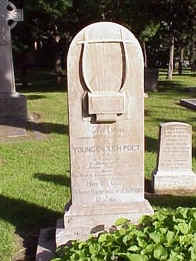Jacques de Molay
 Freak total
Freak total
- Registro
- 2 Nov 2003
- Mensajes
- 18.013
- Reacciones
- 14
Abro un hilo nuevo sobre los románticos, veréis cuánto tienen de precursores de los malditos (en quienes lo romántico ha devenido ya malsano y enfermizo).
Empiezo con un par de poemas del malogrado Percy Bysshe Shelley:

De quien se puede encontrar una biografía en:
https://www.epdlp.com/escritor.php?id=2306
Ozymandias
I met a traveler from an antique land
Who said: Two vast and trunkless legs of stone
Stand in the desert. Near them, on the sand,
Half sunk, a shattered visage lies, whose frown,
And wrinkled lip, and sneer of cold command,
Tell that its sculptor well those passions read,
Which yet survive, stamped on these lifeless things,
The hand that mocked them, and the heart that fed,
And on the pedestal these words appear:
"My name is Ozymandias, King of Kings:
Look upon my works, ye Mighty, and despair!"
Nothing beside remains. Round the decay
Of that colossal wreck, boundless and bare
The lone and level sands stretch far away.
Ozymandias
Me encontré con un viajero de un antiguo país
Que dijo: dos grandes piernas de piedra sin tronco
Están en el desierto... junto a ellas en la arena,
Medio hundido yace un rostro roto, cuyo ceño
Y su fruncido labio y su fría expresión
Revelan que su escultor entendió bien las pasiones
Que aún perviven grabadas en la piedra muerta.
La mano que las desafió y el corazón que alimentaron
y en el pedestal se leen estas palabras:
«Mi nombre es Ozymandias, rey de reyes:
contempla mi obra, oh poderoso, y desespera»
Nada permanece. Alrededor de la decadencia
De este colosal naufragio, desnuda y sin fin
Las solitarias y llanas arenas se extienden a lo lejos.
-----------------------------------------------------------
Wake the serpent not
Wake the serpent not -- lest he
Should not know the way to go, --
Let him crawl which yet lies sleeping
Through the deep grass of the meadow!
Not a bee shall hear him creeping,
Not a may-fly shall awaken
From its cradling blue-bell shaken,
Not the starlight as he's sliding
Through the grass with silent gliding.
No despertéis jamás a la serpiente
No despertéis jamás a la serpiente,
Por miedo a que ella ignore su camino;
Dejad que se deslive mientras duerme
Sumida en la honda yerba de los prados.
Que ni una abeja la oiga al arrastrarse,
Que ni una mosca efímera resurja
De su sueño, acunada en la campánula,
Ni las estrellas, cuando se escabulla
Silente entre la hierba, escurridiza.
He ahí su tumba:

Empiezo con un par de poemas del malogrado Percy Bysshe Shelley:
De quien se puede encontrar una biografía en:
https://www.epdlp.com/escritor.php?id=2306
Ozymandias
I met a traveler from an antique land
Who said: Two vast and trunkless legs of stone
Stand in the desert. Near them, on the sand,
Half sunk, a shattered visage lies, whose frown,
And wrinkled lip, and sneer of cold command,
Tell that its sculptor well those passions read,
Which yet survive, stamped on these lifeless things,
The hand that mocked them, and the heart that fed,
And on the pedestal these words appear:
"My name is Ozymandias, King of Kings:
Look upon my works, ye Mighty, and despair!"
Nothing beside remains. Round the decay
Of that colossal wreck, boundless and bare
The lone and level sands stretch far away.
Ozymandias
Me encontré con un viajero de un antiguo país
Que dijo: dos grandes piernas de piedra sin tronco
Están en el desierto... junto a ellas en la arena,
Medio hundido yace un rostro roto, cuyo ceño
Y su fruncido labio y su fría expresión
Revelan que su escultor entendió bien las pasiones
Que aún perviven grabadas en la piedra muerta.
La mano que las desafió y el corazón que alimentaron
y en el pedestal se leen estas palabras:
«Mi nombre es Ozymandias, rey de reyes:
contempla mi obra, oh poderoso, y desespera»
Nada permanece. Alrededor de la decadencia
De este colosal naufragio, desnuda y sin fin
Las solitarias y llanas arenas se extienden a lo lejos.
-----------------------------------------------------------
Wake the serpent not
Wake the serpent not -- lest he
Should not know the way to go, --
Let him crawl which yet lies sleeping
Through the deep grass of the meadow!
Not a bee shall hear him creeping,
Not a may-fly shall awaken
From its cradling blue-bell shaken,
Not the starlight as he's sliding
Through the grass with silent gliding.
No despertéis jamás a la serpiente
No despertéis jamás a la serpiente,
Por miedo a que ella ignore su camino;
Dejad que se deslive mientras duerme
Sumida en la honda yerba de los prados.
Que ni una abeja la oiga al arrastrarse,
Que ni una mosca efímera resurja
De su sueño, acunada en la campánula,
Ni las estrellas, cuando se escabulla
Silente entre la hierba, escurridiza.
He ahí su tumba:

















